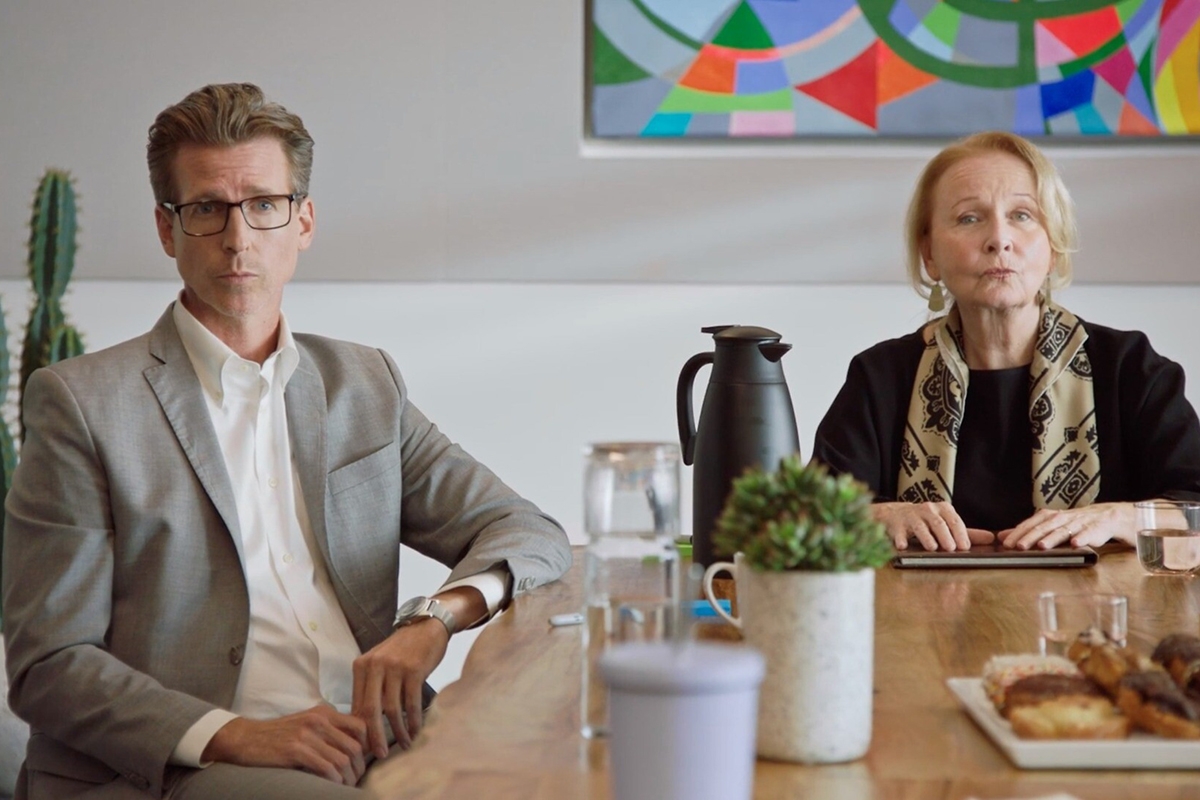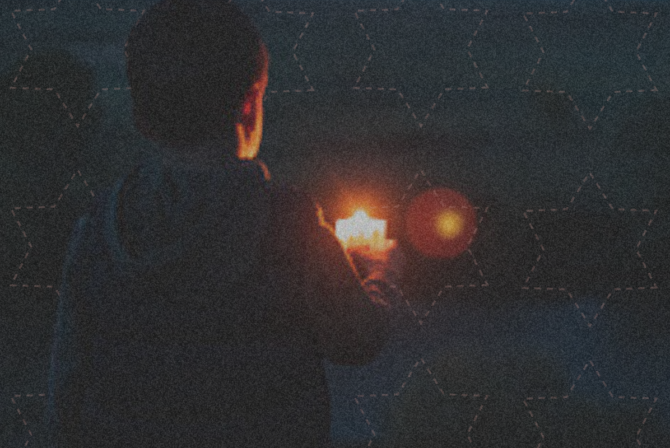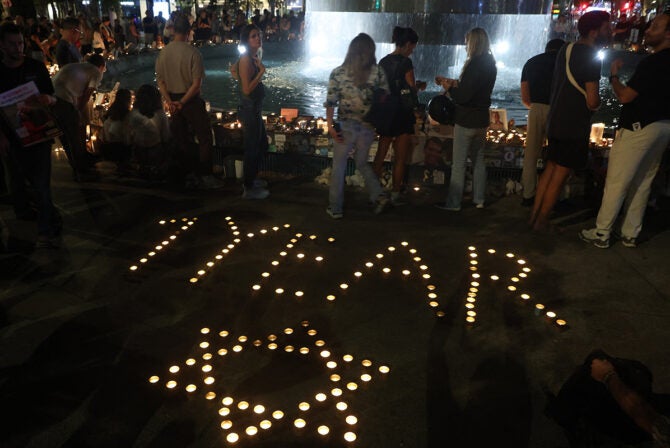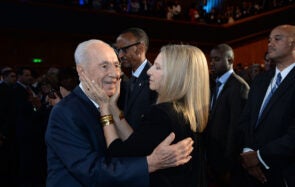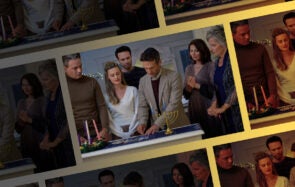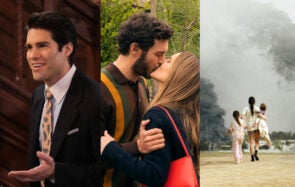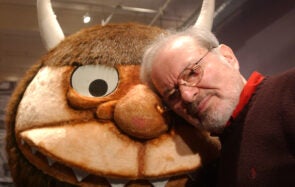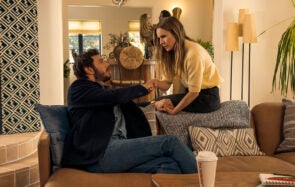The first time Mickey Rapkin went into the Anne Frank House in Amsterdam was a religious experience.
“You can’t believe you’re there,” he recalls about the visit almost two decades ago. “You’re in this sacred space, and you’re walking around, and you’re silent, taking it all in — and I’m crying, you know, I’m having the emotional reaction you expect you’re going to have.”
But when he finished his tour and, like at most museums, exited through the gift shop, that sense of reverence abruptly snapped.
“I remember having this almost inappropriate laughter of like, oh my God, I’ve just had this emotional experience. And now I’ll buy a postcard.”
It was that jarring juxtaposition and unexpected humor that inspired Rapkin’s directorial debut, a short comedic film titled “The Anne Frank Gift Shop,” which was recently shortlisted for an Oscar. In the film, which features a magnetic cast, a design team meets with representatives of Amsterdam’s Anne Frank House and one sassy young online influencer to try to answer a question many of us have been asking: How do you “sell” the memory of the Holocaust to a younger generation?
It’s a weighty question, especially in America, where a 2020 study, cited by a few of the film’s characters, found that the majority of Americans do not know how many Jews were killed the Holocaust — and that 11% of them even think Jews are somehow to blame for the atrocities that befell them.
“The Anne Frank Gift Shop” is joltingly, infectiously funny thanks to a dry humor-filled script by Rapkin, a seasoned journalist and writer who wrote “Pitch Perfect” (yes, the charming book your favorite a cappella movie franchise is based on).
Ari Graynor, who you may know from shows like “Mrs. America” and “I’m Dying Up Here,” plays Amy, an employee of the advertising firm who comes to the meeting hungover, noshes on donuts and delivers some of the movie’s most brutal lines. The excellent Chris Perfetti (“Abbott Elementary”) plays Ben, who throughout the whole meeting is hounded by phone calls from his father. Comedian Mary Beth Barone is Madison, an influencer brought in to be the face of this new campaign, and who keeps noting that the annex is so big, pondering how much it would rent for in any other metropolis. Jason Butler Harner, of “Ozark” fame who is also Rapkin’s spouse, plays a particularly excited exec who is trying to tamper down both Amy and Madison. Josh Meyers of “MadTV” and the legendary Kate Burton (“Grey’s Anatomy,” “Scandal”) play the two representatives from the Anne Frank House, lending the movie, and the meeting, much needed gravitas.
It’s Burton’s character who drives the point home that “we have to keep telling the story again and again and again, or it will happen again.”
“Kate Burton is a legend. That she came to play in our little sandbox for two days was incredible,” Rapkin told Kveller.
While some believe that jokes and the Holocaust shouldn’t go together, movies like “The Anne Frank Gift Shop” (and another recent short film, “Heritage Day“) show us that there are actually good, smart Holocaust jokes to be made, ones that confront dark instincts and inconvenient truths. “I think comedy is how we process trauma,” Rapkin says.
With every disarming peal of laughter, Rapkin and the movie’s characters also manage to open and soften the audience, allowing to then impart some inalienable truths about the Holocaust and its memory.
“There’s a very serious message in the movie, but you’re supposed to laugh. It’s a comedy first,” Rapkin says.
The Holocaust was a part of Rapkin’s Jewish childhood, something he was taught to revere — but it also reached him through art. He recalls going to see “The Diary of Anne Frank” on Broadway, starring Natalie Portman (“I grew up on Long Island, so she was like a local hero.”) He also watched “Schindler’s List” on a school trip.
The film also riffs off a moment in which the Holocaust touched Rapkin personally. On his first visit to Yad Vashem in Israel, he recalls his group’s guide: “At the very end of the tour, she told this really moving personal story, that she was the daughter of survivors. I was weeping. I just spent an hour and a half with this woman. It just brought it home. Not that it was a magic trick, but it felt like a magic trick — she punched me in the stomach.”
In the film, Rapkin recreates that moment in a subversive way through a monologue Madison gives about a Holocaust survivor’s story. He gives the viewer that same gut-punching moment, then breaks it away with a stunningly brazen joke.
In the end, it’s Graynor’s Amy who brings up the most touching suggestion of the movie — to recite the Mourner’s Kaddish, the Jewish prayer eulogizing the dead, at the end of each day at the museum, to connect the visitor with the sense of grief. Then, each actor around the table recites it together.
Rapkin recalled how Josh Meyers, who, like his brother, fellow comedian Seth Meyers, is not Jewish, really nailed the recitation of the Kaddish on their first Zoom reading. “I got emails from two people being like, can we talk about the prayer? I really, really need to work on it,” because they were so intimidated by Meyers’ recitation.
“I actually think it’s a good idea. At events, people are like, do you think the Anne Frank House should do any of these ideas that are pitched in the movie? I’m like, ‘I kind of do.’ I think ending every day with this prayer could be really powerful.”
The movie did actually make its way to the Anne Frank House, who reached out to Rapkin, funnily enough, through LinkedIn. Rapkin was terrified to send them the movie, but it had just won an award at a film festival, and so he did.
“They watched it. They laughed, which was a relief. But then they also admitted, ‘we’ve had these same conversations internally about how do we reach young people,'” Rapkin recalls.
Since October 7, people have been asking Rapkin how he feels now that his movie feels more timely than ever. “I’m like, I feel awful! I wish it was not so timely. It’s horrible. I just feel like now it’s arriving in this time where we’re reminded what’s at stake,” Rapkin says.
“I feel like we didn’t really have time to grieve. I felt like Jews were like, immediately on the defensive,” Rapkin says. But he says screenings since that moment have actually been healing. “We’ve been gathered together in a theater or in a restaurant, and we’re having a cathartic experience together. That’s been really beautiful to see.”
The communal experience of grief goes way beyond the Jewish community. When I ask Rapkin how the prayer scene resonates with non-Jewish audiences, he tells me about the first public screening of the film at a festival in California this past summer.
Rapkin was nervous about how it would sit with audiences. Out of seven films, it ended up being the last screening of the night. It felt like a gamble: a dark comedy about the Holocaust showing at a dark theater in downtown LA.
“I was so relieved when people started laughing — really laughing,” he recounts. “And then you could hear a pin drop during the Kaddish. I felt like, they don’t know the words, necessarily, but everybody understands grief. It was really beautiful to see, to have that feeling of community together. You don’t have to be Jewish.”
“This has been a hard three years, you know, on top of a million other hard years,” Rapkin says. “And to sit in a theater and have a communal experience together of any kind was really, really special and beautiful. I will never forget that night.”
You can watch this movie on ChaifFlicks
